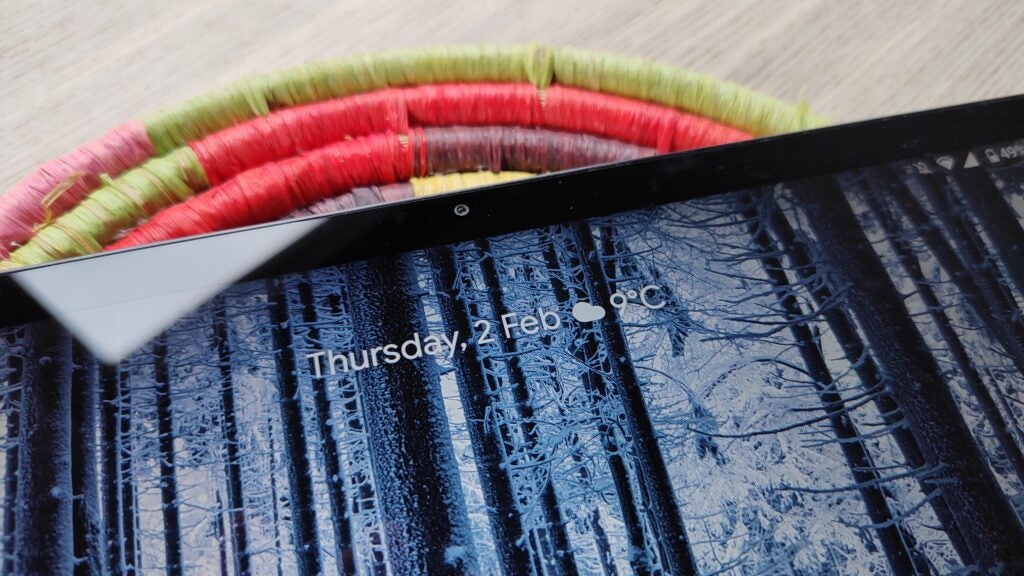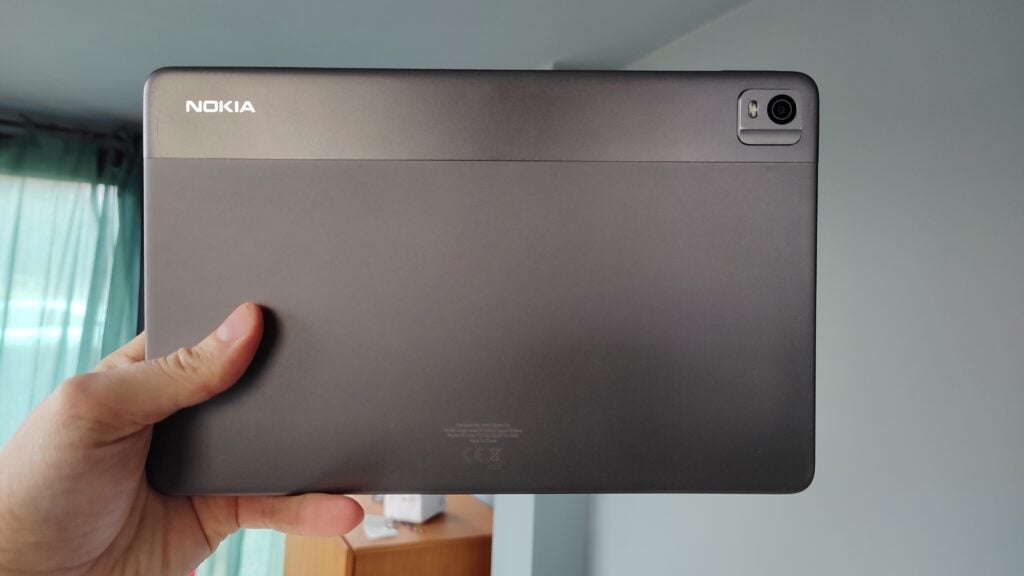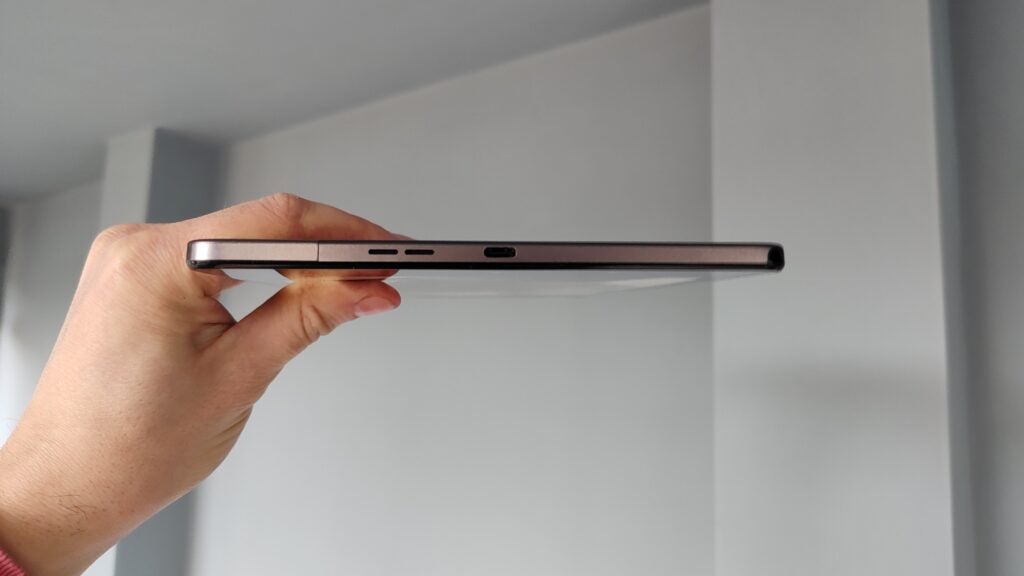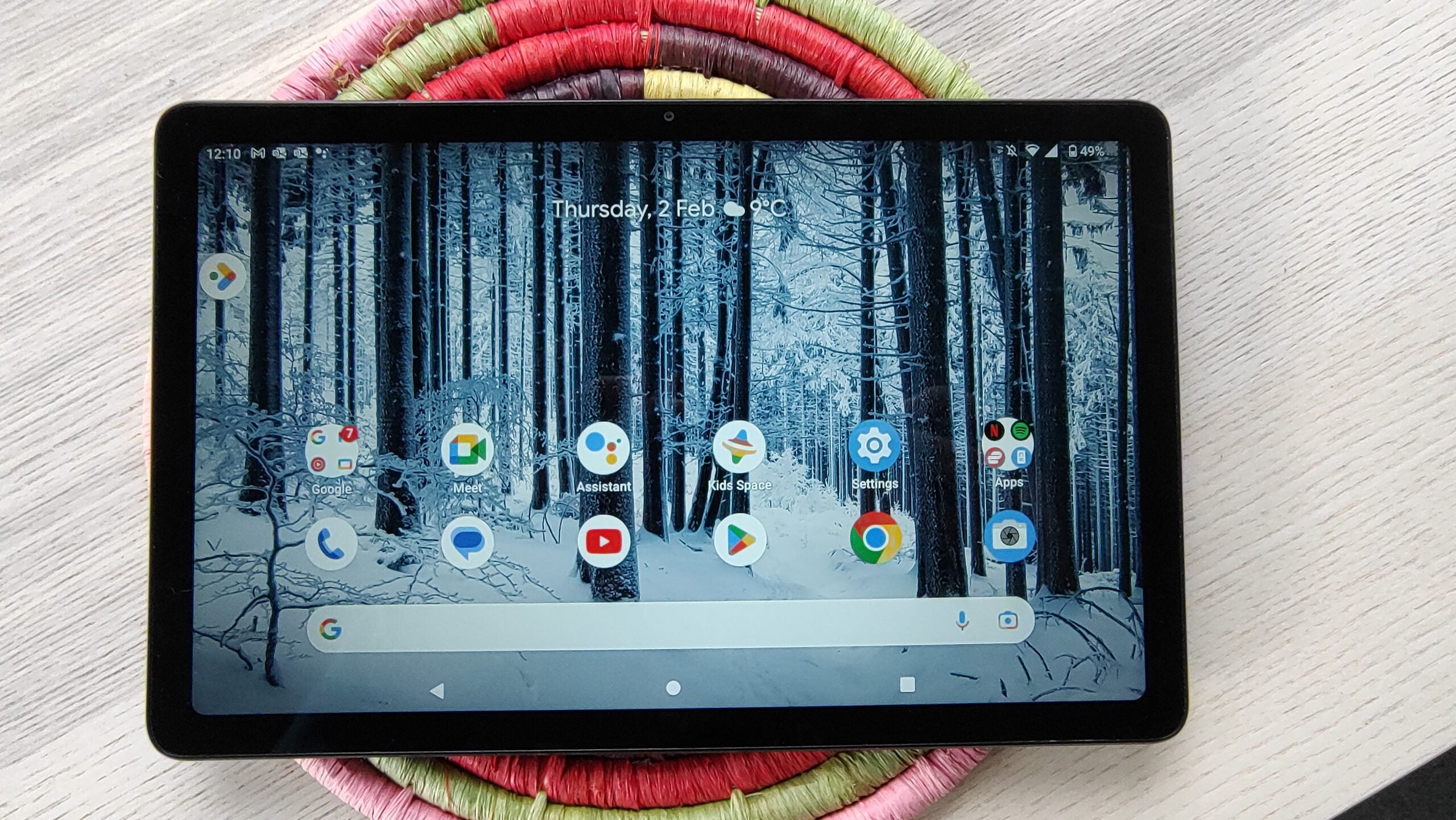Verdict
It is a tough time to break into the tablet market, but the Nokia T21 stands a chance of making a dent. With a sustainable design, good screen, long battery life and loud speakers it works well as a couch companion, and for business buyers, it offers second-screen connectivity and a SIM slot. There is a weighty caveat, the T21 is slow to charge and in general use, but if you can get around this and are in the market for a well-rounded budget tablet, it should be one to consider.
Pros
- High-res 2K display
- Affordable
- Decent battery life
- Optional cellular connectivity
Cons
- Sluggish performance
- Entry-level camera setup
- No high refresh rate
Availability
- UKRRP: £199
- USAunavailable
- EuropeRRP: €219
- Canadaunavailable
- Australiaunavailable
Key Features
Introduction
The tablet game has suddenly become interesting again. For years, things have been the same, with Apple dominating the high-end and Amazon at the low-end with their respective offerings. Across this last year, however, the market has been kickstarted by new types and classes of slate, from huge e-readers to ultra-premium devices and more.
And of these, the T21 from Nokia is a particularly interesting example. To the IT buyer, it wants to be an enterprise-ready mobile workstation, and for the average joe, it wants to be a couch-ready entertainment solution – no easy task in either case. It also faces a suite of competition, in particular from Lenovo which has a range of similar performers at the same entry point of £200.
In trying to stretch to the needs of two wildly different kinds of consumer there are all kinds of potential pitfalls, so does the Nokia T21 have what it takes to really blast itself a hole in the market?
Read on for our full review.
Design and Screen
- An IPS LCD screen with 2K resolution
- Rear is encased in metal
- Has a 3.5mm headphone jack
The ‘tablet’ as we know it is not a category that lends itself to daring or original designs. What the public expects is a glass rectangle, and that is mostly what the public gets. With the T21, Nokia faces a further hurdle, which is to produce a device that is also appropriate for the workplace – hot pink or any other flights of fancy are therefore a no-go.
Against these criteria, the T21 can be judged as a success. It is indeed a glass rectangle, but it is comfortable to hold and, at 466g, light enough to do so one-handed. Its rear is coated in a solid-feeling metal and has a touch of flair with a two-tone design. The fact that both of these tones are solid grey is without consequence – it may not be an especially interesting device to look at, but at the same price point, none are. That it is 60% recycled is also a nice bonus.
It is of course not without fault, with an initial issue being that it does feel a little hollow and flimsy. Especially as only ‘toughened glass’ is used to protect the display instead of the usual Gorilla Glass, this is a tablet that will benefit from a screen protector and a case.
Happily, it also sports a 3.5mm headphone jack and has an interesting feature in its Second Screen capability. Working over WiFi and with some lag, this allows the device to become a helpful aid for working on the move and is useful for the likes of Powerpoint presentations.

For business buyers, the option of a SIM slot will make this an invaluable companion for travel, while Active Stylus support will make the T21 a potentially attractive option for budding artists.
The display itself is entirely functional if never remarkable. At 2000×1200 it has enough resolution to keep most content sharp, meaning that it can work well as both an e-book reader and a miniature TV.
Colours out of the box verge a little cool, but this can be altered in the settings, and we found that brightness was sufficient for most indoor settings. Venturing outside is possible, but legibility in bright sunlight was an issue.
Happily, the T21 has Widevine L1 support, meaning that it can stream the likes of Netflix in high definition. There’s no mention of HDR or any other marketing terms, but for the price this is a screen that will please most, most of the time. The stereo speakers are loud enough to make most content pop too.
Missing is a high refresh rate of any description. Though this may be far from standard at the price point for tablets, even a jump to 90Hz would aid considerably in improving the ‘fluidity’ of the device, making it feel a little faster and fancier in everyday use.
Camera
- Rear camera is 8MP with autofocus and a flash
- Front facing camera is 8MP and fixed focus
- Lacks many smartphone camera functions
The people on the planet who use tablets as their primary photographic devices are definitely in the minority, yet they persist.
There isn’t a budget tablet available today that puts picture performance front and centre, and the Nokia T21 continues that trend without any deviation.
On the rear, there is an 8MP sensor with autofocus and a flash, while on the front an 8MP fixed focus selfie snapper pulls main duty.

Images from the rear sensor are fine, with the understanding that this is a camera to be used for scanning documents and nothing more. Within this context it works well enough, for anything else, suffice it to say that you should use your smartphone.
On the front things are roughly similar. In good light there is enough detail, decent colours and sufficient dynamic range, conditional on the use case being an impromptu Zoom call. This is a camera primarily for video calling, nothing more. Low light conditions, as might be expected, pose a particular challenge.
Overall, against its main theoretical use cases, the Nokia T21 is successful. It won’t replace a camera now or ever, but for document scanning and Zoom calls it fits the bill.


Performance
- Runs a Unisoc T162
- Comes with 4GB of RAM and 64GB of eMMc storage by default
- Runs mostly ‘stock’ Android
The Nokia T21, for a tablet and especially for the price point, has a lot to differentiate it from the crowd. In a few key areas it is lacking, and of those general performance is its biggest bugbear.
A Unisoc T612 powers the device, alongside 4GB of RAM and 64GB of eMMC storage, and the latter can increase with different configurations, but the RAM remains constant.
Qualcomm rules the roost in the smartphone chip game, with MediaTek and a few others playing a distant second. Unisoc is a relative unknown, and while Nokia devices have used its chipsets before, here we see why it isn’t further up the pecking order.
The Nokia T21 is a slow tablet, not in an obvious and dramatic way, but in one that gradually adds up over time. When opening an app, it skips a beat, when loading a webpage the same happens. Rinse and repeat a few dozen times per day, and it begins to grate.
This feeling is borne out by Geekbench 5 results, where the T21 manages 321 in the single-core category and 1410 in multi-core. In very broad terms, this places it in the same category as devices sporting the Snapdragon 660, a chip first announced in 2018. That’s hardly inspiring.
Within the context of its intended use cases, i.e. sofa Netflix surfing and light office work, the performance of the T21 can be viewed as sufficient. Outside of that rigid definition, however, the picture is a lot less rosy.
In most tasks, such as swiping through the interface, email, web browsing and the like, there’s nary a problem to be found – though this is the bare minimum of what can be expected in the present. Anything more taxing than that and things go downhill quickly.
Demanding apps, and some heavy web pages, take a long time to load. Games such as PUBG are payable at low settings, though they still don’t provide the best experience. If you are in the small subset who want a gaming tablet, an iPad may be a better value proposition.
That the tablet is so slow out of the box doesn’t bode well for future use, but with two years of promised software updates, there’s hope that the picture may improve with time.
As is the case with other devices bearing the Nokia branding, the T21 runs a stripped-back version of Android mostly devoid of any features or frippery. In the case of the T21, this is a very good thing, keeping the performance hit light. It also helps that Google’s changes to the stock Android tablet experience have been very much for the better across the past few years.
Battery life
- Has an 8200mAh battery
- Offers 18W fast charging via PD 3.0
- Charges over USB-C
With a weaker processor usually comes a useful tradeoff: longer battery life. This is a consequence of two factors, with the first being that slower processors tend to sip power in general use. The second is that with less processing power available, the user is less likely to engage in power-hungry activities, i.e. less gaming and more watching of videos.
And with the two of those factors in mind, the Nokia T21 draws a strong showing from its large 8200 mAh power pack, with the heavy proviso that it will not be used for heavy gaming. Any attempt to do so is nothing less than sheer masochism.

With a mixture of web browsing, casual gaming, writing, watching videos and streaming music over Bluetooth, around eight hours of screen time across three days proved to be the norm. For most, this tablet will be able to make it to the end of a second day with moderate usage. With the SIM slot active this figure will of course go down.
Quick charging is available when the time comes, though no charger is provided in the box. At 18W it isn’t the fastest, and in practice proves to be even slower than expected, going from 0-100% in two hours. A charging schedule will be a must if you intend to use the Nokia T21 while travelling.
Latest deals
Should you buy it?
You need SIM capability on a budget tablet
The Nokia T21 is one of the cheapest tablets on the market with cellular connectivity, allowing you to work and stream without a Wi-Fi connection.
You need competitive fast charging
Even with 18W ‘fast charging’ the 8,200mAh battery will take around two hours to go from flat to full.
Final Thoughts
It has been a long time since the tablet game was last interesting, but things are finally beginning to heat up once again, thanks to the likes of the Nokia T21.
Boasting a good screen, loud speakers and great battery life, it has chops as an affordable couch companion for the masses. That it has a SIM slot, active pen stylus support and second-screen functionality is merely icing on the cake, and a definite boon for business buyers.
There is a large caveat attached, which is that the T21 is slow. Not deal-breakingly so, but this isn’t a slate for budding mobile gamers of any stripe.
If you are in the market for something more capable than the Amazon Fire 10 but don’t want to step up to iPad level, the Nokia T21 should be at the top of your list. It is an accomplished offering, and the best budget tablet for many buyers today.
How we test
Unlike other sites, we thoroughly test every product we review. We use industry-standard tests in order to compare features properly. We’ll always tell you what we find. We never, ever accept money to review a product.
FAQs
No charger is included with this tablet
It is not rated for water resistance
It does have a headphone jack
It doesn’t have wireless charging
Verdict
It is a tough time to break into the tablet market, but the Nokia T21 stands a chance of making a dent. With a sustainable design, good screen, long battery life and loud speakers it works well as a couch companion, and for business buyers, it offers second-screen connectivity and a SIM slot. There is a weighty caveat, the T21 is slow to charge and in general use, but if you can get around this and are in the market for a well-rounded budget tablet, it should be one to consider.
Pros
- High-res 2K display
- Affordable
- Decent battery life
- Optional cellular connectivity
Cons
- Sluggish performance
- Entry-level camera setup
- No high refresh rate
Availability
- UKRRP: £199
- USAunavailable
- EuropeRRP: €219
- Canadaunavailable
- Australiaunavailable
Key Features
Introduction
The tablet game has suddenly become interesting again. For years, things have been the same, with Apple dominating the high-end and Amazon at the low-end with their respective offerings. Across this last year, however, the market has been kickstarted by new types and classes of slate, from huge e-readers to ultra-premium devices and more.
And of these, the T21 from Nokia is a particularly interesting example. To the IT buyer, it wants to be an enterprise-ready mobile workstation, and for the average joe, it wants to be a couch-ready entertainment solution – no easy task in either case. It also faces a suite of competition, in particular from Lenovo which has a range of similar performers at the same entry point of £200.
In trying to stretch to the needs of two wildly different kinds of consumer there are all kinds of potential pitfalls, so does the Nokia T21 have what it takes to really blast itself a hole in the market?
Read on for our full review.
Design and Screen
- An IPS LCD screen with 2K resolution
- Rear is encased in metal
- Has a 3.5mm headphone jack
The ‘tablet’ as we know it is not a category that lends itself to daring or original designs. What the public expects is a glass rectangle, and that is mostly what the public gets. With the T21, Nokia faces a further hurdle, which is to produce a device that is also appropriate for the workplace – hot pink or any other flights of fancy are therefore a no-go.
Against these criteria, the T21 can be judged as a success. It is indeed a glass rectangle, but it is comfortable to hold and, at 466g, light enough to do so one-handed. Its rear is coated in a solid-feeling metal and has a touch of flair with a two-tone design. The fact that both of these tones are solid grey is without consequence – it may not be an especially interesting device to look at, but at the same price point, none are. That it is 60% recycled is also a nice bonus.
It is of course not without fault, with an initial issue being that it does feel a little hollow and flimsy. Especially as only ‘toughened glass’ is used to protect the display instead of the usual Gorilla Glass, this is a tablet that will benefit from a screen protector and a case.
Happily, it also sports a 3.5mm headphone jack and has an interesting feature in its Second Screen capability. Working over WiFi and with some lag, this allows the device to become a helpful aid for working on the move and is useful for the likes of Powerpoint presentations.

For business buyers, the option of a SIM slot will make this an invaluable companion for travel, while Active Stylus support will make the T21 a potentially attractive option for budding artists.
The display itself is entirely functional if never remarkable. At 2000×1200 it has enough resolution to keep most content sharp, meaning that it can work well as both an e-book reader and a miniature TV.
Colours out of the box verge a little cool, but this can be altered in the settings, and we found that brightness was sufficient for most indoor settings. Venturing outside is possible, but legibility in bright sunlight was an issue.
Happily, the T21 has Widevine L1 support, meaning that it can stream the likes of Netflix in high definition. There’s no mention of HDR or any other marketing terms, but for the price this is a screen that will please most, most of the time. The stereo speakers are loud enough to make most content pop too.
Missing is a high refresh rate of any description. Though this may be far from standard at the price point for tablets, even a jump to 90Hz would aid considerably in improving the ‘fluidity’ of the device, making it feel a little faster and fancier in everyday use.
Camera
- Rear camera is 8MP with autofocus and a flash
- Front facing camera is 8MP and fixed focus
- Lacks many smartphone camera functions
The people on the planet who use tablets as their primary photographic devices are definitely in the minority, yet they persist.
There isn’t a budget tablet available today that puts picture performance front and centre, and the Nokia T21 continues that trend without any deviation.
On the rear, there is an 8MP sensor with autofocus and a flash, while on the front an 8MP fixed focus selfie snapper pulls main duty.

Images from the rear sensor are fine, with the understanding that this is a camera to be used for scanning documents and nothing more. Within this context it works well enough, for anything else, suffice it to say that you should use your smartphone.
On the front things are roughly similar. In good light there is enough detail, decent colours and sufficient dynamic range, conditional on the use case being an impromptu Zoom call. This is a camera primarily for video calling, nothing more. Low light conditions, as might be expected, pose a particular challenge.
Overall, against its main theoretical use cases, the Nokia T21 is successful. It won’t replace a camera now or ever, but for document scanning and Zoom calls it fits the bill.


Performance
- Runs a Unisoc T162
- Comes with 4GB of RAM and 64GB of eMMc storage by default
- Runs mostly ‘stock’ Android
The Nokia T21, for a tablet and especially for the price point, has a lot to differentiate it from the crowd. In a few key areas it is lacking, and of those general performance is its biggest bugbear.
A Unisoc T612 powers the device, alongside 4GB of RAM and 64GB of eMMC storage, and the latter can increase with different configurations, but the RAM remains constant.
Qualcomm rules the roost in the smartphone chip game, with MediaTek and a few others playing a distant second. Unisoc is a relative unknown, and while Nokia devices have used its chipsets before, here we see why it isn’t further up the pecking order.
The Nokia T21 is a slow tablet, not in an obvious and dramatic way, but in one that gradually adds up over time. When opening an app, it skips a beat, when loading a webpage the same happens. Rinse and repeat a few dozen times per day, and it begins to grate.
This feeling is borne out by Geekbench 5 results, where the T21 manages 321 in the single-core category and 1410 in multi-core. In very broad terms, this places it in the same category as devices sporting the Snapdragon 660, a chip first announced in 2018. That’s hardly inspiring.
Within the context of its intended use cases, i.e. sofa Netflix surfing and light office work, the performance of the T21 can be viewed as sufficient. Outside of that rigid definition, however, the picture is a lot less rosy.
In most tasks, such as swiping through the interface, email, web browsing and the like, there’s nary a problem to be found – though this is the bare minimum of what can be expected in the present. Anything more taxing than that and things go downhill quickly.
Demanding apps, and some heavy web pages, take a long time to load. Games such as PUBG are payable at low settings, though they still don’t provide the best experience. If you are in the small subset who want a gaming tablet, an iPad may be a better value proposition.
That the tablet is so slow out of the box doesn’t bode well for future use, but with two years of promised software updates, there’s hope that the picture may improve with time.
As is the case with other devices bearing the Nokia branding, the T21 runs a stripped-back version of Android mostly devoid of any features or frippery. In the case of the T21, this is a very good thing, keeping the performance hit light. It also helps that Google’s changes to the stock Android tablet experience have been very much for the better across the past few years.
Battery life
- Has an 8200mAh battery
- Offers 18W fast charging via PD 3.0
- Charges over USB-C
With a weaker processor usually comes a useful tradeoff: longer battery life. This is a consequence of two factors, with the first being that slower processors tend to sip power in general use. The second is that with less processing power available, the user is less likely to engage in power-hungry activities, i.e. less gaming and more watching of videos.
And with the two of those factors in mind, the Nokia T21 draws a strong showing from its large 8200 mAh power pack, with the heavy proviso that it will not be used for heavy gaming. Any attempt to do so is nothing less than sheer masochism.

With a mixture of web browsing, casual gaming, writing, watching videos and streaming music over Bluetooth, around eight hours of screen time across three days proved to be the norm. For most, this tablet will be able to make it to the end of a second day with moderate usage. With the SIM slot active this figure will of course go down.
Quick charging is available when the time comes, though no charger is provided in the box. At 18W it isn’t the fastest, and in practice proves to be even slower than expected, going from 0-100% in two hours. A charging schedule will be a must if you intend to use the Nokia T21 while travelling.
Latest deals
Should you buy it?
You need SIM capability on a budget tablet
The Nokia T21 is one of the cheapest tablets on the market with cellular connectivity, allowing you to work and stream without a Wi-Fi connection.
You need competitive fast charging
Even with 18W ‘fast charging’ the 8,200mAh battery will take around two hours to go from flat to full.
Final Thoughts
It has been a long time since the tablet game was last interesting, but things are finally beginning to heat up once again, thanks to the likes of the Nokia T21.
Boasting a good screen, loud speakers and great battery life, it has chops as an affordable couch companion for the masses. That it has a SIM slot, active pen stylus support and second-screen functionality is merely icing on the cake, and a definite boon for business buyers.
There is a large caveat attached, which is that the T21 is slow. Not deal-breakingly so, but this isn’t a slate for budding mobile gamers of any stripe.
If you are in the market for something more capable than the Amazon Fire 10 but don’t want to step up to iPad level, the Nokia T21 should be at the top of your list. It is an accomplished offering, and the best budget tablet for many buyers today.
How we test
Unlike other sites, we thoroughly test every product we review. We use industry-standard tests in order to compare features properly. We’ll always tell you what we find. We never, ever accept money to review a product.
FAQs
No charger is included with this tablet
It is not rated for water resistance
It does have a headphone jack
It doesn’t have wireless charging

























